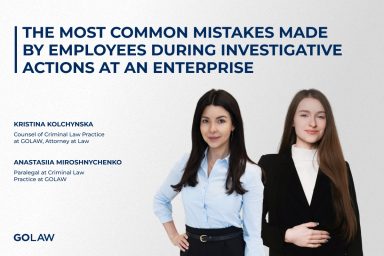BEPS implementation in the Tax Code of Ukraine
Tags
Contents
The widely discussed draft law 1210 has finally been signed by the President of Ukraine and come into effect on May 23 (Law No. 466). This is why business will have to adjust to new rules of the game. The Law mostly aims to implement the main measures under the BEPS Project, which our state undertook to do as early as in December 2019 by ratifying the MLI Convention.
The new rules concern mainly medium-sized and large businesses whose ownership structure includes foreign companies, or those business entities which mostly work with non-residents.
What will change in the international aspects of taxation?
It will be more difficult to obtain benefits under Double Tax Treaties, the concept of “beneficial owner” has been specified in detail and the “principal purpose test” of the business transaction and “sound economic reason” criteria have been introduced.
Starting from May 23, any transaction with a non-resident must meet the “sound economic reason” principle. Otherwise, a resident must increase its income by the amount of expenses under such a transaction. In this case, it shall be deemed that there is no business purpose if the principal purpose of a transaction is non-payment of tax, or if a resident would not enter into such an agreement with a non-related non-resident on the same conditions.
Almost the same rule has been introduced for the possibility to enjoy benefits on withholding tax under Double Tax Treaties (the “principal purpose” test). From now on, a taxpayer will have to prove that the principal purpose of a transaction is not tax evasion, otherwise, he/she will have to pay the 15% tax.
The revised Tax Code contains a clarified definition of a beneficial owner of income and states that this shall be the person who has the actual benefit from the income. Furthermore, it contains examples when a person may not be deemed a beneficiary: a company with no sufficient resources and personnel, an intermediary company, which transfers the obtained income to third parties bears no significant risks and has no rights to use and dispose of such income.
Positive changes in international taxation
Law 466 also contains positive innovations. For instance: the introduction of a “look-through approach” to determine a beneficial owner of income and a mutual agreement procedure.
In particular, it is now possible to use the Double Tax Treaty not with the direct owner of income, but with its beneficial owner (“look through” approach). If a taxpayer understands that he/she pays income to an intermediary company, which then transfers it to a real beneficiary, the real beneficiary may apply to the tax authorities for confirmation of its status of beneficial owner of the income. In this case, the resident will be able to enjoy the benefit under the international convention with the real beneficiary of income and reduce the withholding tax rate.
Furthermore, the Tax Code introduces an additional chain of the administrative procedures for challenging the decisions of tax authorities concerning the application of international conventions. This procedure is called the mutual agreement procedure (it will presumably come into effect in six months). Under such a procedure, a taxpayer may challenge a decision of the tax authorities to a competent body (the Ministry of Finance), and, after consultations with a foreign company, the taxpayer’s complaint may be granted. In any case, the taxpayer reserves the right to further challenge a decision of the tax authorities in court.
Permanent establishments of non-residents
However, not all novelties of Law 466 are positive. The new rules of taxation for non-residents, which have been in effect since May 23, make the presence of the latter in Ukraine much more difficult without a permanent establishment. For instance, residents using the corporate mail of a non-resident, who enter into agreements on behalf on a non-resident, or residents holding negotiations on concluding agreements by non-residents shall be equal to a permanent establishment. In addition, persons providing services in Ukraine on behalf of a non-resident for more than 183 days a year may be recognized as permanent establishments. Such persons will have to register with tax authorities as a permanent establishment and to pay tax on non-residents’ income at the general rate of 18%. Moreover, the tax authorities now have the right to register a non-resident’ establishment following the results of inspecting its activity in Ukraine and to charge the non-resident a penalty of UAH 100,000 for failure to register the permanent establishment.
Indirect sale of real estate
The Tax Code invalidates the possibility to sell Ukrainian real estate without paying taxes in Ukraine through the sale of corporate rights of foreign legal entities. From now on, a non-resident buyer must register with the Ukrainian tax authorities and withhold a 15% tax from the non-resident buyer’s income obtained from the sale of an investment asset.
It is important to understand that only corporate rights of foreign legal entities (the Ukrainian companies were left aside) are recognised as an investment asset and only subject to certain conditions. In particular, a foreign company must hold at least 50% of shares of a Ukrainian company, the authorised capital of which is more than by 50% formed at the expense of real estate throughout a year preceding the transaction. The Code contains very interesting and ambiguous provisions on determining the value of real estate, which are likely to be clarified soon.
CFC Rules
The new rules of taxation of income of controlled foreign companies, which may come into effect from January 1, 2021, are likely the most widely discussed. The new rules will de facto allow Ukraine to charge taxes on incomes of foreign companie (including partnerships and trusts) controlled by residents of our state. The rules for determining the control are quite universal and will be rather hard to avoid. For instance, a foreign company may be recognised as controlled by a Ukrainian resident if the latter conducts transactions with banking accounts of a foreign company, holds negotiations on the CFC entering into agreements or has the power of attorney to hold such negotiations and sign agreements for more than 1 year.
At the same time, rules on CFC taxation contain a lot of exceptions from which one may benefit. For instance, a CFC will not be charged taxes for its income in Ukraine unless the company’s income is 50% or more passive income, or if the company pays corporate income tax at the effective tax rate of 13% or more. Moreover, even passive income may be recognized as active for taxation purposes should it be possible to prove that the company is actually present and that it has staff and fixed assets.
And, finally, provisions of the Tax Code on CFCs will be further clarified and amended and are likely to come into effect by January 1, 2021.
What to think about right now
Considering the large number of new introductions, we recommend that businesses take measures that will help them avoid penalties and potential disputes with the tax authorities. In particular, we suggest conducting an audit of all agreements with non-residents and determining and confirming that such agreements contain a business purpose. As a result of such an audit, it will be possible either to change the structure of a transaction or to determine the correct withholding tax rate.
Concerning cooperation with non-residents, we suggest determining the risks of the emergence of a permanent establishment in Ukraine, taking measures on minimising them or registering a permanent establishment.
Concerning controlled foreign companies, firstly, we suggest determining whether or not your company can be recognised as a CFC and, secondly, checking if benefits on non-payment of CFC income tax in Ukraine are applicable to you. Following the results of the analysis it should be decided what will be the most feasible option for you: to administer a CFC or to enjoy a benefit and liquidate a CFC while paying no taxes.
The article has been published at KyivPost website.
Sign up to be aware
New achievements are inspired by information. GO further, don’t miss out GOLAW news and legal alerts
Our expertise
-
- Antitrust and Competition
- Banking and Finance
- Compliance, Corporate Governance and Risk Management
- Corporate and M&A
- Criminal and White Collar Defence
- Defense in Anti-corruption procedures and regulations
- Labor and Employment
- Natural Resources and Environment
- Government Relations (GR)
- Insolvency and Corporate Recovery
- Intellectual property
- International trade
- Legal support of business and private Сlients in Germany
- Litigation and dispute resolution
- Private clients
- Real Estate and Construction
- Energy and Natural Resources
- Restructuring, Claims and Recoveries
- Martial Law
- Tax and Customs
-
- Agribusiness
- Aviation
- Chemical industry
- Engineering, Construction and Building Materials
- Natural Resources and Environment
- Financial institutions
- IT and AI
- Industry and manufacturing
- Healthcare industries, Life sciences and Pharmaceuticals
- Media, Entertainment, Sports and Gambling
- Retail, FMCG and E-Commerce
- Transport and Logistics
We use cookies to improve performance of our website and your user experience.
Cookies policy
Cookies settings







